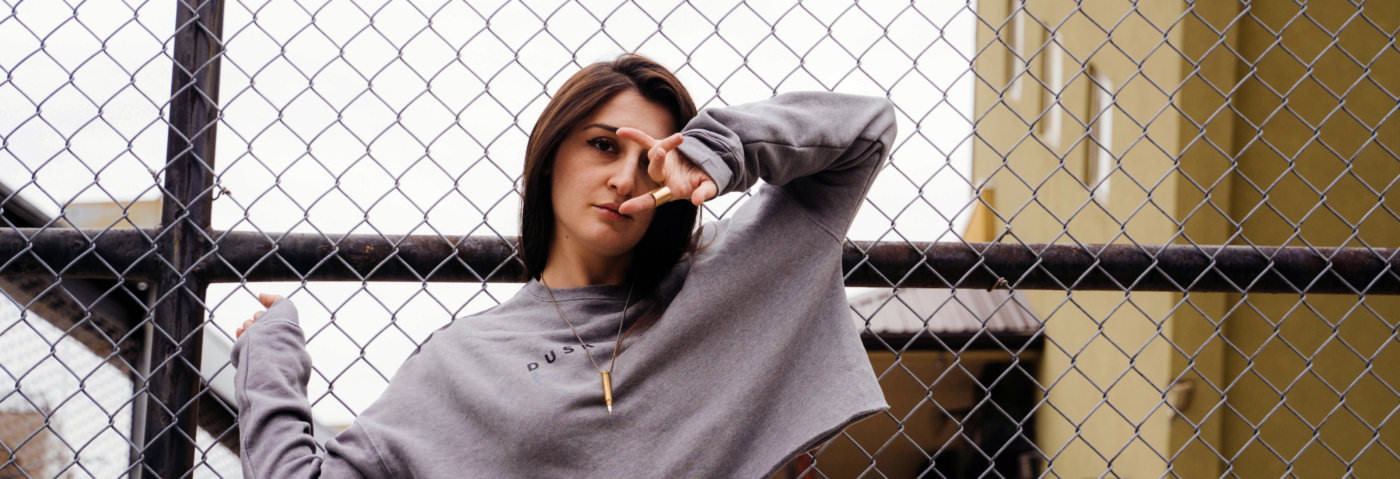Sophia Saze is a refugee who after having lived in five countries, worked for the Georgian Embassy in the US, turned down a job offer at the CIA to work for CitiBank and then left to pursue music. We spoke with her to discover how music was the only constant and how it defines her.
Personal identities are tricky things, morphing with time and place. The person we are in our twenties often has little in common with who we are in our thirties. But deep within most of us lies a core identity, one that’s been constructed by our earliest and most formative experiences.

As the child of a Georgian refugee family, Sophia Saze spent much of her youth on the move. She lived in five countries and eight cities growing up, and has long carried with her a lingering feeling of displacement. No one is shaped entirely by where they come from. But with so little to permanently hold on to in her childhood, Saze grasped at the few constants in her life with everything she had.
“It was the only thing that kept me together,” she says about music and the arts. Saze grew up playing the piano and dancing, and thinks her parents relied on her hours spent practicing as a way to shield her from “the pain and suffering that comes with coming from a migrant family,” though they never actually said as much. No matter how desperate the situation became or how much things changed, young Saze could always lose herself in her creativity, and her parents protected that.
But there was another struggle brewing within her. Unlike American parents, Georgian families don’t traditionally view music or dancing lessons as a potential career path. “It’s assumed that will never be the thing,” Saze says. “That’s sad, because there’s so many incredible [Georgian] artists, and I think that’s a huge reason we’re seeing a wave of incredible musicians coming out of Georgia — the arts coming to the surface.” Her parents were also very poor, and Saze saw her academics as a way to escape poverty.
Graduating at the top of her high school class, Saze was accepted with a full scholarship to the prestigious The George Washington University, a private university in Washington, D.C. “Which was a weird experience, because everyone was a rich, entitled kid who never had to work for anything, and I was the complete antithesis,” she says. Saze was a diplomacy major, and worked at the Georgian Embassy. “I was really dedicated to this cause of helping humanity.” But she also struggled with a “really crippling doubt about what I could do with my creativity because I forced myself to believe that money….”
She doesn’t finish the thought. But after knocking back an offer from the CIA — ”their invitation process is really cryptic” — she took a job on Wall Street at CitiBank. “I had no idea what the job even was. I didn’t even understand the role. I just felt like I had to take it,” she says. She was miserable. But her time in New York City was far from a waste. She was working intensely hard all day long, spending nights and weekends immersed in the rave scene, “partying really hard.” She wasn’t DJing yet, but she’d been given a copy of Logic 9 during university as a way to record her piano sessions, and began experimenting with electronic music production.
“I landed a few releases and thought, ‘cool, I get how this works,’” she says, though she’d later realize her naivety. After three years on Wall Street, CitiBank needed to know if she wanted to continue working there. Saze wasn’t sure. By that point, she was DJing, and decided to spend six months traveling Europe playing gigs, while “scoping out whether this was a world that I could actually pursue,” she says. “In New York, you don’t really see a full industry side. But in Europe, I had gone to ADE, I saw there were more opportunities.”
With no backup plan, she came back and quit her job. “I had no idea what’s going to happen, but I knew this was something I wanted to pursue, finally, for the first time in my life,” she says.
Despite the potential precariousness of her situation, she wasn’t scared. “I’m so used to being in risky situations because of my childhood upbringing. My compass of what’s scary is very different from most people.” Plus, she was desperately eager to begin writing music. What she wasn’t ready for was everything else. “Actually having to maintain a career,” as she puts it.
She struggled for the first few years, confused and overwhelmed by the unwritten rules the music industry operates on. “Success is not a direct output of your work, like in any other job,” she says. In academia or the corporate world, good work is recognized for what it is, and often rewarded, even if you’re a “hermit,” as Saze describes herself. Suddenly, good work wasn’t enough. There was networking, and knowing the right people. “For example, I did promo for a release, and a magazine had seen it but totally overlooked it. But then when I had a friend nudge them, it was completely accepted.” Which had her wondering whether or not the industry was compatible with her moral outlook.
I’m so used to being in risky situations because of my childhood upbringing. My compass of what’s scary is very different from most people
So she decided to build her own world, which she’s done partly through her label, Dusk & Haze. It’s an outlet she hopes will treat artists the way she wishes bigger labels would treat them. But she also wants her music to spread a powerful message — especially with her debut album, Self.
Today, Saze is known as a techno artist. But her early inspirations include Massive Attack, Boards Of Canada, Aphex Twin, Autechre, and Dopplereffekt, and traces of each can be heard across all 14 tracks of Self. It’s dreamy, abstract, ambient, even formless at times. And, like her dance floor productions, it’s intricate and exquisitely produced. She wrote most of part one of the album in a single 48-hour jam session. Later she added field recordings (which she captured on her iPhone before running those through analog pedals), including conversations with friends, soviet cartoons she watched as a kid, and VHS recordings of intimate moments with her family.
“We all have multiple layers to our identity, this sense of duality,” she says. “I love techno, but having to constantly adhere to a single aesthetic is not a true portrayal of any artist.” She’s keenly aware that she’d have more bookings right now if she’d produced an album of bangers. But what really concerned Saze on her first album is whether or not another dance floor record would accomplish anything in a broader sense.
“We have to take into account that music is always going to be so influential, and whatever we’re doing now is going to be guiding the masses. But where are we taking listeners? What is the message?”
For Saze, that message is slowing down, and taking a step back from our image-centric, social media-driven reality, which thrives on constant comparisons. “We’ve built all this fear around us. It’s vital people overstep this.”

Once she showed the album to other artist friends, Saze says they opened up in a way she’d never seen before. “Immediately they’d play me their more obscure projects. I definitely sense that artists are afraid of freely putting out whatever they want, because there’s a sort of stigma, that once you’re knowing for one genre it’s expected that’s your ceiling. Linearity is uninteresting. Artists shouldn’t be afraid of pushing the limits. Art has always been about breaking rules, not hiding a boring bubble. I want every record to be different from the last, beyond any expectations, free of all genres. I also think techno is really too intense at the moment, hard to distinguish quality hard music, because we’ve got hyped up djs lacking experience slamming rave bangers so hard it just becomes a noise competition, dull and unexciting.”
But perhaps most importantly for Saze, making the album acted as a form of therapy. She was able to reflect on some of the most painful times in her life, which helped her discover so much more about her own identity.
“I was traumatized, so I had a lot of things I needed to process. But it wasn’t until I wrote this record that it really made sense. You face your fear, the common thread between all these things, and for me, it was separation, being detached from places. And once I had constructed the whole thing, which were all from my experiences, it all added up and led me to this source of inspiration, or the reason why everything happened the way it had.”
Now, after eight years in New York City, Saze is focused on moving to Europe. Though she’s not sure where yet, and she’s taking her time deciding. “Most likely London,” she says. “It’s like the New York of that part of the world. And I’ve always been drawn to the UK sound.”
She’s also looking forward to the release of part two of Self, which will be out in July. Like part one, it will steer clear of the dance floor, but it will feature vocalist Ricardo Rivera, who appears on part one, much more prominently. “We were both in a very difficult period of our lives in relation to the health of our respective mothers, so we really resonated on a very deep level of identity and belonging,” she says. “He takes the record to a whole other dimension. It’s incredible his elegant form and etiquette on stage, how he is able to morph into character, ecstatic for the live show to come out.”
Sophia Saze’s Self is out now on Kingdoms. Buy it here.
To check out Sophia Saze’s studio check out our My Studio feature.
Chandler Shortlidge is a dance music journalist based in Berlin. Follow him on Twitter.
